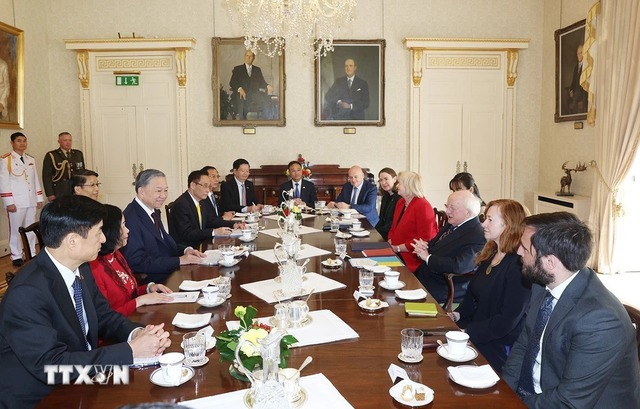Top Vietnamese leader holds talks with Irish President
VGP - General Secretary and President To Lam held talks with Irish President Michael Higgins in Dublin, Ireland, on October 2, as part of his three-day state visit to the European country.

General Secretary and President To Lam holds talks with Irish President Michael Higgins, Dublin, Ireland, October 2, 2024 - Photo: VNA
Higgins hailed Viet Nam's foreign policy, affirming that Ireland treasures Viet Nam's position and role in Asia-Pacific.
He expressed his impressions on Viet Nam's achievements in socio-economic development, international integration, and realization of the Sustainable Development Goals (SDGs).
Viet Nam is Ireland's leading trade partner and there is still ample room for cooperation between the two countries, asserted the host.
He acknowledged Viet Nam's proposal to accelerate the ratification of the EU-Viet Nam Investment Protection Agreement (EVIPA) to expand cooperation and investment opportunities between the two nations' business communities.
The Irish President expressed his hope that Viet Nam will make it easier for Ireland to export its high-quality agricultural products and food to the Southeast Asian nation.
To Lam, for his part, reiterated that Viet Nam places importance on developing the friendship and multifaceted cooperation with Ireland.
Viet Nam highly values the Irish Government giving priority to Viet Nam in its development cooperation policy within the framework of the "Global Ireland: Delivering in the Asia Pacific Region to 2025" strategy, he added.
He expressed his hope that Ireland will continue providing development assistance for Viet Nam in the prioritized areas such as green growth, climate change adaption, environmental protection, information technology, digital transformation and sustainable development.
The guest took the occasion to announce that the Vietnamese Government has decided and is implementing procedures for the opening of the Vietnamese Embassy in Ireland.
Both leaders expressed their belief that this decision will open a new development stage for the bilateral ties for the common interests of their peoples.
They vowed to increase all-level delegation exchanges, especially high-level ones, and actively carry out existing cooperation mechanisms.
Economic, trade and investment cooperation is an important pillar of the bilateral ties and is developing positively, they noted, expecting that the two-way trade turnover will reach US$3.5 billion in 2024.
Both nations should effectively take advantages of the EU-Viet Nam Free Trade Agreement (EVFTA), enhance trade-investment linkages, support their business communities; and strive to raise bilateral trade to US$5 billion on the occasion of the 30th founding anniversary of their diplomatic relations in 2026, they suggested.
The two sides welcomed the establishment of a strategic partnership on higher education between the Vietnamese Ministry of Education and Training and the Irish Department of Further and Higher Education, Research, Innovation and Science, and the signing of a Memorandum of Understanding (MoU) between the Viet Nam National University, Ha Noi and leading universities of Ireland.
Education and training cooperation is a priority area of the two countries' ties, which aims to improve the quality of training, develop high-quality human resources, and promote scientific research and innovation in Viet Nam, they emphasized.
They underlined the need to step up people-to-people exchanges, cultural and artistic cooperation, tourism cooperation, and local-to-local cooperation.
Both leaders discussed regional security issues of common concern, such as the situations in Ukraine and the Middle East. They called on all sides to protect civilians, conduct dialogue, and address disputes by peaceful measures on the basis of international law and the fundamental principles of the United Nations Charter.
They pledged to push for stronger ties at multilateral forums such as ASEAN-EU and the United Nations and work together to cope with global challenges, climate change, food security, and ensure supply chains.
The two sides voiced their support for ASEAN's principled stance on the East Sea issue in terms of ensuring peace, stability, security, cooperation and development in the region, and handling disputes by peaceful means on the basis of respect for international law, especially the 1982 United Nations Convention on the Law of the Sea (UNCLOS)./.

